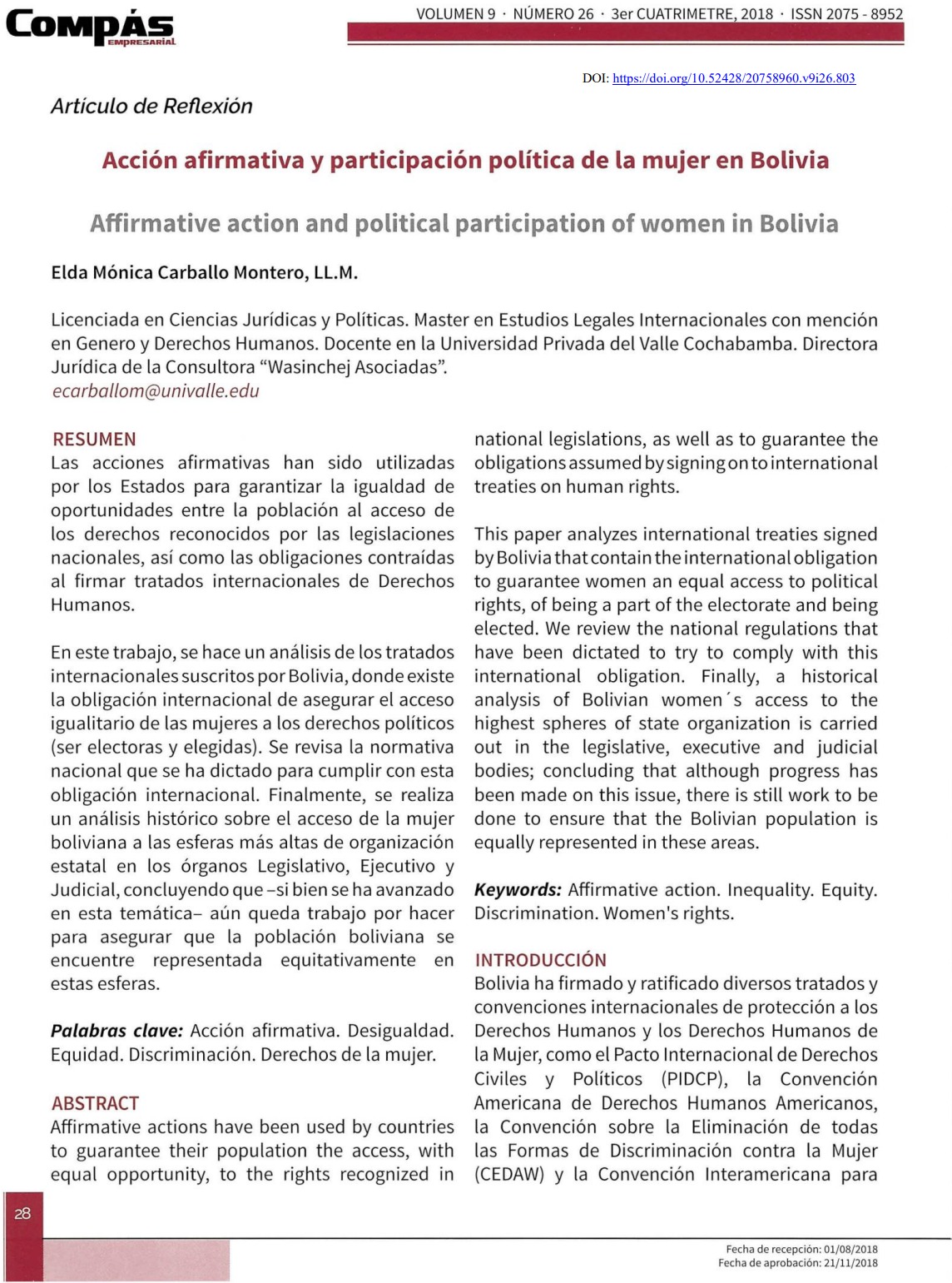Affirmative Action and Political Participation of Women in Bolivia
DOI:
https://doi.org/10.52428/20758960.v9i26.803Keywords:
Affirmative action, lnequality, Equity, Discrimination, Women's rightsAbstract
Affirmative actions have been used by countries to guarantee their population the access, with equal opportunity, to the rights recognized in national legislations, as well as to guarantee the obligations assu med by sign i ng on to internationa l treaties on human rights. This paper analyzes international treaties signed by Bolivia thatcontain the international obligation to guarantee women an equal access to political rights, of being a part of the electorate and being elected. We review the national regulations that have been dictated to try to comply with this international obligation. Finally, a historical analysis of Bolivian women "s access to the highest spheres of state organization is carried out in the legislative, executive and judicial bodies; concluding that although progress has been made on this issue, there is still work to be done to ensure that the Bolivian population is equally represented in these areas.
Downloads
References
(1) CIDH (2011). Informe: El Camino hacia una Democracia Sustantiva: La Participación Política de las Mujeres en las Américas. OEA/ Ser.L/V/I1. Doc. 79. Consultado el 10 de agosto de 2018. Recuperado de: https://www.cidh.oas.org/pdf%20fiIes/mujeres%20partieipacion%20politica.pdf
(2) CIM-IDEA (2013). La Apuesta por la Paridad: Democratizando el Sistema Político en América Latina los Casos de Ecuador, Bolivia y Costa Rica. Consultado el 8 de agosto de 2018. Recuperado de: http://www.oas.org/es/CIM/docs/ApuestaPorLaParidad-Fina1-Web.pdf
(3) Donoso, Y. (2011). Tras 184 años, la Corte Suprema cierra un ciclo con 56 presidentes. Consultado el 12 de agosto de 2018. Recuperado de: http://www.la-razon.com/nacionaljCorte-Suprema-cierra-ciclopresidentes_0_1532846809.html.14/08/2018
(4) Franco Pinto, C. (2017). Mujeres bolivianas: desde el Parlamento hasta la Asamblea Legislativa Plurinacional l. lnsurgencias femeninas hacia el epicentro del poder (siglos XX-XXI). La Paz: Vicepresidencia del Estado Plurinacional, Entidad de las Naciones Unidas para la Igualdad de Género y el Empoderamiento de las Mujeres.
(5) OEA (1969). Convención Americana de Derechos Humanos. UNTS 123. Consultado el 14 de agosto de 2018. Recuperado https://www.oas.org/diljesp/tratados_b-32_convencion_americana_sobre_derechos_humanos.htm
(6) OEA (1994). Convención lnteramericana para Prevenir, Sancionar y Erradicar la Violencia contra la Mujer (Convención de Belem do Para). 33 I.L.M.1534. Consultado el 15 de agosto de 2018. Recuperado de: http://www.refworld.org/docid/3ae6b38blc.html
(7) OEP (2011). Separata de Resultados Judiciales 2011. Consultado el 28 de agosto de 2018. Recuperado https://www.oep.org.bo/wp-content/uploads/2017/03/separata_resultados_judiciales_2011.pdf
(8) OEP (2017). Separata de Resultados Judiciales 2017. Consultado el 20 de agosto de 2018. Recuperado de: https://www.Ocp.org.bo/wp-content/upIoads/2018/01/separata_resultados_elecciones_judiciales_2017.pdf 20/08/2018.
(9) ONU (1966) Pacto Internacional de Derechos Civiles y Políticos. Serie de Tratados de las Naciones Unidas, Vol. 993, N' 14531. Consultado el 15 de agosto de 2018. Recuperado de: https://www.ohehr.org/sp/professionaIinterest/pages/ccpr.aspx
(10)ON U (1979). Convención sobre la Eliminación de todas las formas de Discriminación contra la Mujer. Serie de Tratados de las Naciones Unidas Vol. 1249 UNTS p.13. Consultado el 15 de agosto de 2018. Recuperado de: http://www.refworld.org/docid/3ae6b3970.html
(11)La Razón (2011). Corte Suprema cierra ciclo de presidentes. Consultada en agosto de 2018. Recuperado de: http://www.la-razan.com/naeionalfCorte-Suprema-eierra-eieIo-presidentes_O_1532846809.htm1
(12)Zubieta, F. (2018) La Acción Afirmativa: ¿Un Mecanismo Para Profundizar la Ciudadanía lntercultural en Bolivia? Consultado el 20 de agosto de 2018. Recuperado de: https://www.academia.edu/2185918/La_Acci%C3%B3n_Afirmativa_Un_mecanismo_para_profundizar_la_ciudadan%C3%ADa_inter-cultural_en_Bolivia
Bibliografía Consultada
(1) Gaceta Oficial de Bolivia. Ley de Partidos Políticos N'l983, 1999.
(2) Gaceta Oficial de Bolivia. Ley del Código Electoral N'l984, 1999.
(3) Gaceta Oficial de Bolivia. Ley del Régimen Electoral N°026, 2010.
(4) Gaceta Oficial de Bolivia. Ley N'0929 de Modificación a las Leyes N'025 del órgano Judicial, N'027 del
Tribunal Constitucional Plurinacional y N'026 del Régimen Electoral, 2017.

Downloads
Published
How to Cite
Issue
Section
License
Copyright (c) 2018 Elda Mónica Carballo Montero

This work is licensed under a Creative Commons Attribution 4.0 International License.
Authors who publish with this journal agree to the following terms:
- Authors retain copyright and grant the journal right of first publication with the work simultaneously licensed under a Creative Commons Attribution License 4.0 that allows others to share the work with an acknowledgement of the work's authorship and initial publication in this journal.
- Authors are able to enter into separate, additional contractual arrangements for the non-exclusive distribution of the journal's published version of the work (e.g., post it to an institutional repository or publish it in a book), with an acknowledgement of its initial publication in this journal.
- Authors are permitted and encouraged to post their work online (e.g., in institutional repositories or on their website) prior to and during the submission process, as it can lead to productive exchanges, as well as earlier and greater citation of published work.









